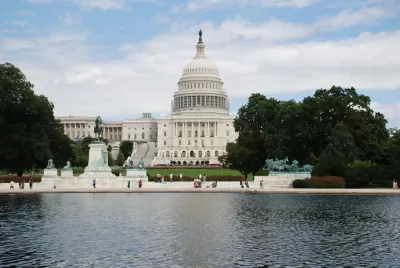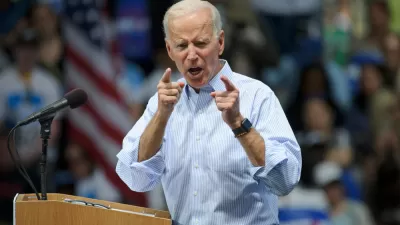Two members of Congress, a Democrat and a Republican, both from Florida, will reintroduce their bill to put a tax on carbon emissions and return the revenue to the people in the form of a dividend.

"Reps. Ted Deutch, D-Fla., and Francis Rooney, R-Fla., plan to revive a carbon tax bill [Jan. 24], the Washington Examiner has learned," according to energy and environment reporter, Josh Siegel. The bill has yet to be assigned a number.
The pair, who co-lead the bipartisan Climate Solutions Caucus, plan to reintroduce legislation, first unveiled in November, that was the first bipartisan carbon tax bill in nearly a decade. The reintroduction is necessary since it’s a new session of Congress.
H.R.7173 - Energy Innovation and Carbon Dividend Act of 2018 was "the second major carbon tax bill introduced by a Republican [last] year, after Rep. Carlos Curbelo of Florida, the GOP co-chair of the Climate Solutions Caucus, introduced national carbon pricing legislation in September without Democratic help," reported Siegel earlier. Curbello was unseated by Democratic challenger Debbie Mucarsel-Powell in the midterm elections.
The [new] bill is intended as a test for a carbon-tax-and-dividend model that distributes all of the revenue from the tax into monthly rebates, divided into equal portions, to American households, protecting them from higher energy costs. The approach differs from that of other proposals that would spend the proceeds of the tax on other things, such as government-funded clean energy investments, or offsets of other taxes.
Both approaches were put to state plebiscites in Washington state in 2016 (Initiative 732) and last year (Initiative 1631), and both were rejected overwhelmingly.
The legislation would impose a tax of $15 per ton of carbon dioxide in 2019, a relatively low starting number. But the price would increase $10 each year, a rapid pace, rising to nearly $100 per ton by 2030, and potentially higher if the emissions targets set in the bill are not met.
In a separate piece, Siegel reports that a "bipartisan coalition of former Federal Reserve chairs, top economic advisers to recent presidents of both parties, and Nobel Prize-winning economists have endorsed a federal carbon tax, one that would distribute all of the revenue to American households, to combat climate change."
“A carbon tax offers the most cost-effective lever to reduce carbon emissions at the scale and speed that is necessary,” the economists said in a joint statement shared with the Washington Examiner. [Continues...]
“This statement represents a major tipping point in U.S. climate policy,” said Janet Yellen, former Federal Reserve chair under Presidents Obama and Trump. “It shows broad agreement among economists and experienced policymakers that carbon dividends is the most cost-effective, equitable and politically-viable climate solution.”
However, Siegel ends his piece on a pessimistic note.
But despite modest momentum, Congress is unlikely to pass carbon pricing legislation anytime soon because of strong resistance from conservatives who view any form of carbon pricing as a tax increase, as well as an emerging preference among progressives for government mandates.
Related in Planetizen:
-
Democrats Take Steps to Address Climate Change in 116th Congress, January 2, 2019
FULL STORY: Bipartisan House pair to revive carbon tax bill

Planetizen Federal Action Tracker
A weekly monitor of how Trump’s orders and actions are impacting planners and planning in America.

Chicago’s Ghost Rails
Just beneath the surface of the modern city lie the remnants of its expansive early 20th-century streetcar system.

San Antonio and Austin are Fusing Into one Massive Megaregion
The region spanning the two central Texas cities is growing fast, posing challenges for local infrastructure and water supplies.

Since Zion's Shuttles Went Electric “The Smog is Gone”
Visitors to Zion National Park can enjoy the canyon via the nation’s first fully electric park shuttle system.

Trump Distributing DOT Safety Funds at 1/10 Rate of Biden
Funds for Safe Streets and other transportation safety and equity programs are being held up by administrative reviews and conflicts with the Trump administration’s priorities.

German Cities Subsidize Taxis for Women Amid Wave of Violence
Free or low-cost taxi rides can help women navigate cities more safely, but critics say the programs don't address the root causes of violence against women.
Urban Design for Planners 1: Software Tools
This six-course series explores essential urban design concepts using open source software and equips planners with the tools they need to participate fully in the urban design process.
Planning for Universal Design
Learn the tools for implementing Universal Design in planning regulations.
planning NEXT
Appalachian Highlands Housing Partners
Mpact (founded as Rail~Volution)
City of Camden Redevelopment Agency
City of Astoria
City of Portland
City of Laramie





























